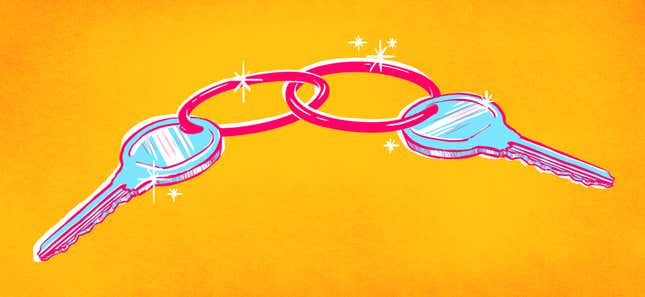Living Together Might Be Just as Beneficial as Marrying, Especially for Women
Latest

So much for the undying stereotype that women need marriage like a fish needs fish gills: New research has found that women get just as much of an emotional boost out of just shacking up as they do out of making it legal. And “emotional boosts” are supposed to be the lady drug of choice.
Researchers Sara E. Mernitz and Claire Kamp Dush at Ohio State University spliced data from the 1997 National Longitudinal Survey of Youth to see how men and women experienced transitions into cohabitation, marriage, or going into a second cohabitation against measures of self-stated emotional well-being. The results, according to Yahoo Health, were thus:
Women had a similar decrease in emotional distress when they moved in with a partner and when they got married.
Men and women had a drop in emotional distress when they cohabited with a second partner or remarried.
Men didn’t have a decrease in emotional distress when they cohabited for the first time, but they did experience a decrease when they went directly into marriage.
Mernitz told the Washington Post she was surprised there wasn’t a greater boost for marriage for women between cohabitation versus marriage. She theorized that it’s possible men don’t take cohabitation as seriously as women—maybe they think of it as a “trial run” or “testing period,” whereas women see it as a sign of serious commitment on the road to wedded bliss. Or it could also be due to the positive benefits of the larger association of coupledom that cohabitation grants. “At one time marriage may have been seen as the only way for young couples to get the social support and companionship that is important for emotional health,” study co-author Claire Kamp Dush said in a news release.
Better yet was the finding that there are also emotional benefits from moving in for the second time, whether from a first living-together-situation to a second, or a living-situation that turned into marriage. Kamp Dush thinks this is due to having better self-selection measures in place the second go-round. (Alternately, after marrying twice, one should probably just live alone for eternity and keep dating.)
Meanwhile, men faced less emotional distress if they went directly into marriage-style living, but not if they just moved in with someone. This, researchers think, is because of that aforementioned tendency men have to “test” relationships through living together, whereas marriage to them means really choosing someone.
-

-

-

-

-

-

-

-

-

-

-

-

-

-

-

-

-

-

-

-

-

-

-

-

-

-

-

-

-

-

-

-

-

-

-

-

-

-

-

-








































